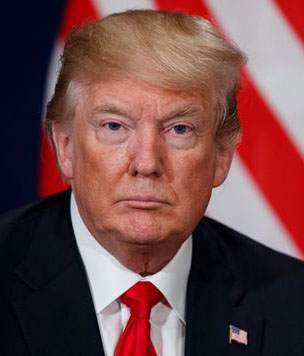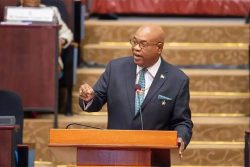WASHINGTON, (Reuters) – President Donald Trump yesterday tied a U.S. trade deal with China to humane resolution of the weeks of protests wracking Hong Kong, hours after the State Department said it was “deeply concerned” about reports of movement of Chinese paramilitary forces along the Hong Kong border.
The State Department warned that continued erosion of the territory’s autonomy put at risk the preferential status it enjoys under U.S. law.
Trump, in his remarks on Twitter, appeared to suggest a personal meeting with Chinese President Xi Jinping to help resolve the crisis.
“Of course China wants to make a deal. Let them work humanely with Hong Kong first!” Trump said on Twitter. “I have ZERO doubt that if President Xi wants to quickly and humanely solve the Hong Kong problem, he can do it. Personal meeting?”
Trump, who has been seeking a major deal to correct trade imbalances with China ahead of his 2020 reelection bid, has faced mounting criticism from Congress and elsewhere for not taking a stronger public line on Hong Kong and for his characterization of the protests earlier this month as “riots” that were a matter for China to deal with.
In his tweets on Wednesday, Trump also said that his delay in 10% tariffs on more than $150 billion in Chinese imports to Dec. 15 from Sept. 1 “will be reciprocated” by China and the “much good will come from the short deferral to December.”
His comment appeared to contradict senior officials in his administration, who said earlier that no concessions were made by Beijing in response to the delay announced on Tuesday.
Trump’s tougher stance on Hong Kong followed an internal debate within the White House and State Department over whether the United States was looking too compliant as the Chinese appeared to be preparing for a crackdown.
A source familiar with the deliberations said while an even-handed approach was smart, it was not the right signal to send in this case.
Earlier, a State Department spokeswoman said the United States was “deeply concerned” about reports of paramilitary movements along the Hong Kong border and reiterated a U.S. call for all sides to refrain from violence.
She said it was important for the Hong Kong government to respect “freedoms of speech and peaceful assembly” and for Beijing to adhere to its commitments to allow Hong Kong a high degree of autonomy.
She said the protests reflected “broad and legitimate concerns about the erosion of Hong Kong’s autonomy.”
“?The continued erosion of Hong Kong’s autonomy puts at risk its long-established special status in international affairs,” she said.
A 1992 U.S. law affords Hong Kong preferential treatment in matters of trade and economics compared with China. Areas of special treatment include visas, law enforcement and investment.
A U.S. official said Beijing had stationed large numbers of paramilitary People’s Armed Police (PAP) “near and further out from Hong Kong,” but said there had been no sign they were moving toward the border.
The number of personnel was “in the thousands,” said the official, who did not want to be identified, and the aim appeared to be to intimidate the protesters.
He said protests had yet to reach a level that would compel Beijing to send them in. “I don’t think they’ve reached any tipping points,” the official said.
“They have amped up training and made it all pretty visible,” he said, but added: “There are no recent indicators that they are preparing to deploy.”
China’s state-run Global Times media outlet reported on Monday that People’s Armed Police had been assembling in Shenzhen, a city bordering Hong Kong, “in advance of apparent large-scale exercises.”
It cited video it had obtained showing numerous armored personnel carriers (APCs), trucks and other vehicles on expressways heading in the direction of Shenzhen over the weekend. It noted that the role of the PAP was “dealing with rebellions, riots, serious violent and illegal incidents, terrorist attacks and other social security incidents.”
Satellite images made available to Reuters on Wednesday from Maxar Technologies showed dozens of vehicles, including what appeared to be APCs, at the Shenzhen Bay Sports Centre across the harbor from Hong Kong.
On Tuesday Trump cited American intelligence as saying that China was moving troops to its border with the former British colony, and urged calm as clashes continued between protesters and authorities.
LAWMAKERS URGE TOUGHER LINE
The State Department’s expression of concern came after senior U.S. lawmakers, both Democrats and Republicans, called on Trump to take a tougher line with China as worries grew over a possible Chinese intervention.
Senate Republican leader Mitch McConnell warned China on Monday that any violent crackdown on protests in Hong Kong would be “completely unacceptable.”
On Tuesday, the Republican chair of the Senate’s East Asia subcommittee, Cory Gardner, said the Trump administration “must make clear to Beijing that any crackdown in Hong Kong will have profound consequences for China, including imposition of U.S. sanctions.”
White House national security adviser John Bolton told the Voice of America on Wednesday that “from what I have heard in just the past few weeks, the mood in Congress is very volatile at this point and a misstep by the Chinese government, I think, would cause an explosion on Capitol Hill.”
Trump said last month that Xi had acted “very responsibly” in dealing with the protests. The Financial Times newspaper reported earlier in July that the U.S. leader had agreed with Xi at the June Group of 20 summit to tone down criticism of China’s handling of the crisis.
On Wednesday, U.S. Commerce Secretary Wilbur Ross appeared to back this approach in a CNBC interview.
“The president has made clear that he is watching very carefully what’s happening,” Ross said. “The question of it is what role is there for the U.S. in that manner? This is an internal matter.”
On Wednesday, the Democratic chairman of the U.S. House of Representatives Foreign Affairs Committee, Eliot Engel, and the panel’s leading Republican, Michael McCaul, said they were concerned that 30 years after the Tiananmen Square massacre, China might again consider brutally putting down peaceful protests.
“We urge China to avoid making such a mistake, which would be met with universal condemnation and swift consequences,” they said in a statement.
Earlier on Wednesday, the State Department issued a travel advisory urging “increased caution in Hong Kong due to civil unrest.”
Flights resumed on Wednesday at the Hong Kong airport, one of the world’s busiest, which shut down for two days after demonstrators occupied it.









